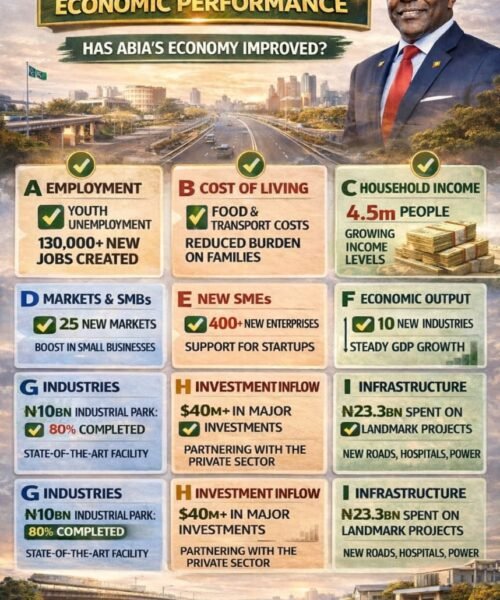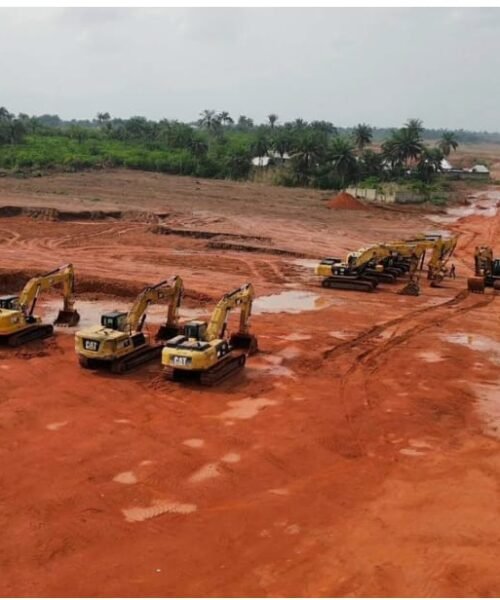Redefining Energy Sovereignty: Governor Alex Otti’s Technocratic Blueprint for Abia’s Power Infrastructure and Socio-Economic Reconfiguration (2023–2025)
Governor Alex Otti’s administration, since its inauguration in May 2023, has prioritized energy security as a cornerstone of Abia State’s socio-economic renaissance, deploying a multifaceted strategy that integrates legislative innovation, infrastructural revitalization, and strategic public-private partnerships. His governance philosophy, rooted in technocratic pragmatism, has sought to dismantle systemic inefficiencies in the energy sector while catalyzing a transition toward sustainable, decentralized power solutions.
Central to Otti’s agenda is the Geometric Power Aba Integrated Energy Project, a 141MW (scalable to 188MW) generation and distribution facility commissioned in early 2025 after two decades of regulatory and political inertia. This vertically integrated initiative, Nigeria’s first of its kind, embeds generation, transmission, and distribution within a ring-fenced grid covering nine local government areas, including Aba, the state’s industrial nucleus. Equipped with GE gas turbines, a 27km gas pipeline, and 140km of fiber-optic-enabled distribution lines, the project now delivers near-uninterrupted power (23–24 hours daily) to over 370,000 households and businesses, directly addressing the chronic energy deficit that stifled Aba’s famed manufacturing sector. Otti’s administration further fortified this achievement by rehabilitating critical road networks—Queens Street, Jubilee Road, and Umuoba Road—to enhance logistical efficiency for industries now thriving under reliable electricity.
Legislative reforms have been equally transformative. In March 2025, Otti assented to the Abia State Electricity Law, a 64-page framework derived from the Nigerian Electricity Act 2023, which empowers the state to regulate its electricity market, establish the Abia State Electricity Regulatory Authority (ASERA), and incentivize renewable energy investments. This law, crafted with input from international energy experts and legal consultants, institutionalizes ring-fenced grids, mandates anti-theft measures, and prioritizes decarbonization through clean energy adoption. It also expands the Aba ring-fence model to Umuahia, aiming to integrate the remaining eight LGAs into a unified grid, thereby universalizing access to stable power. The governor’s vision extends beyond state boundaries; he envisions Abia as a regional energy hub, capable of wheeling surplus electricity to neighboring states, thereby monetizing excess capacity and reinforcing regional energy interdependence.

Fiscal discipline underpins these initiatives. The 2025 budget of ₦750.28 billion, with an unprecedented 82% allocation to capital expenditure, reflects Otti’s commitment to infrastructural permanence. Specific allocations target energy infrastructure, including the completion of the Umuahia-Uzuakoli-Abiriba-Ohafia road corridor and the retrofitting of public facilities with solar energy systems, aligning with global sustainability benchmarks. This budgetary rigor, coupled with partnerships like the $50 million Afreximbank loan for Geometric Power’s expansion, underscores a governance model that leverages fiscal prudence and international finance to de-risk energy investments.
Otti’s energy diplomacy further shines through collaborations with federal and international stakeholders. In March 2025, he pledged support for the National Assembly’s Renewable Energy Summit, aligning Abia’s policies with national grid modernization goals. This synergy dovetails with ongoing negotiations to integrate solar and hydroelectric projects into the state’s energy mix, ensuring diversification away from fossil fuels. Such efforts are amplified by the Abia Global Economic Advisory Council (AGEAC), which mobilizes global expertise to refine the state’s energy masterplan, emphasizing innovation in smart grids and energy storage technologies.
The outcomes are already measurable: Aba’s industries report a 40% reduction in operational costs due to diminished reliance on diesel generators, while household energy expenditure has dropped by 30%. Yet, challenges persist, particularly in gas supply chain vulnerabilities and legacy tariff disputes. Otti’s administration confronts these through stringent contractual safeguards with gas suppliers and tariff reforms under ASERA’s oversight, ensuring cost-reflective pricing without exacerbating energy poverty.
In essence, Governor Otti’s energy strategy—a blend of legislative foresight, infrastructural audacity, and collaborative governance—has repositioned Abia as a beacon of energy sovereignty in Nigeria. By transcending mere electrification to forge a resilient, inclusive energy ecosystem, his policies not only illuminate homes and factories but also rekindle hope in a state once synonymous with infrastructural decay. The journey remains incomplete, but the foundational strides suggest a future where Abia’s energy security becomes a template for national emulation.

Dr Chukwuemeka Ifegwu Eke writes from Yakubu Gowon University Nigeria







